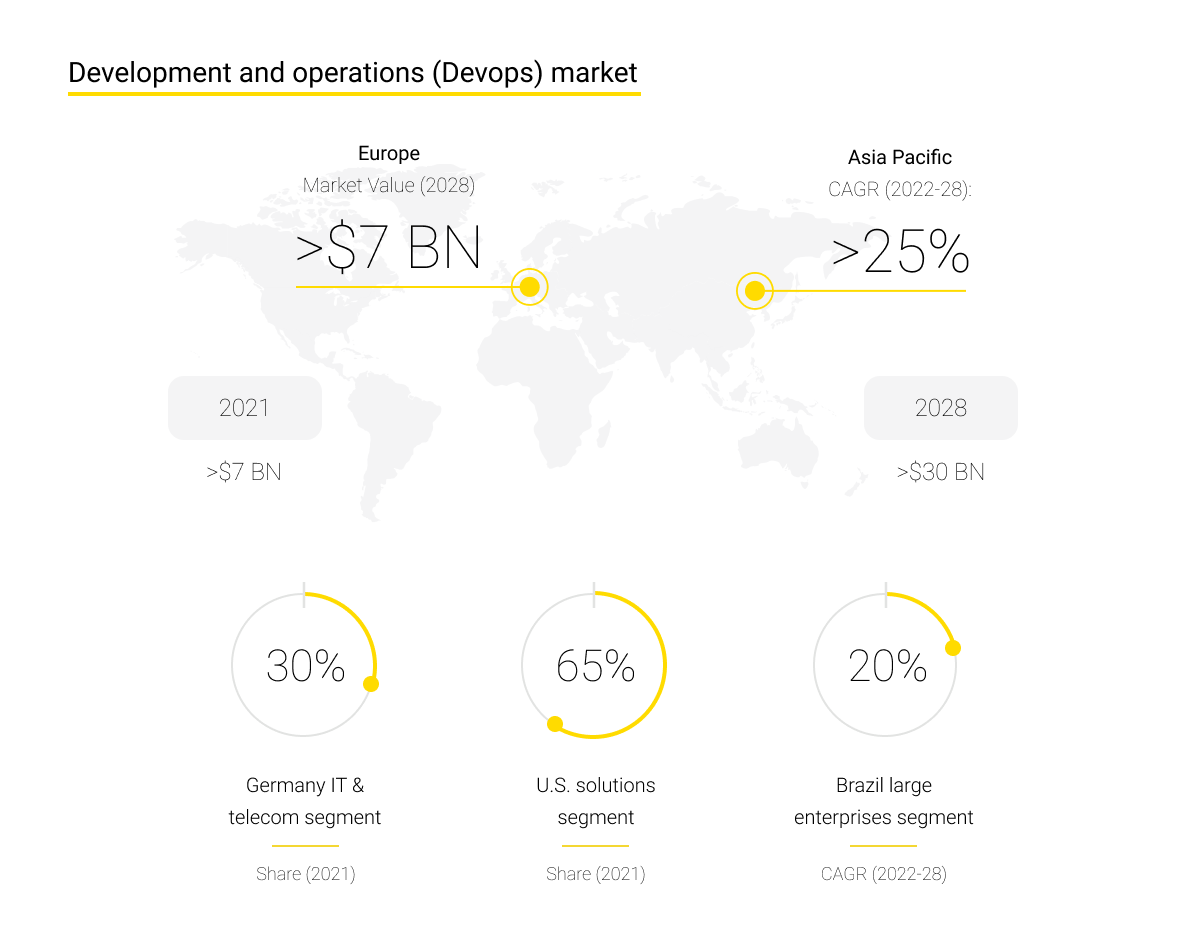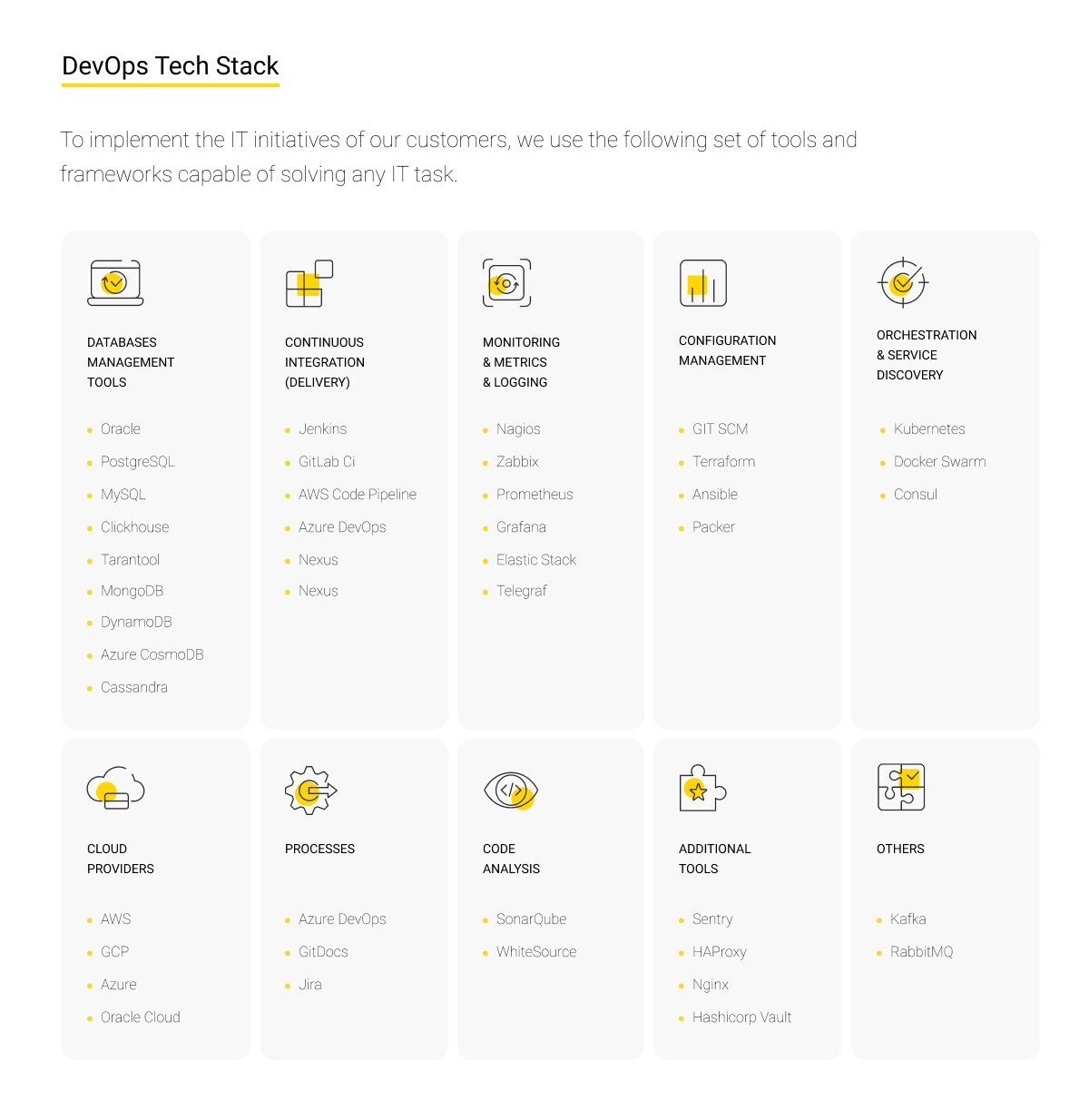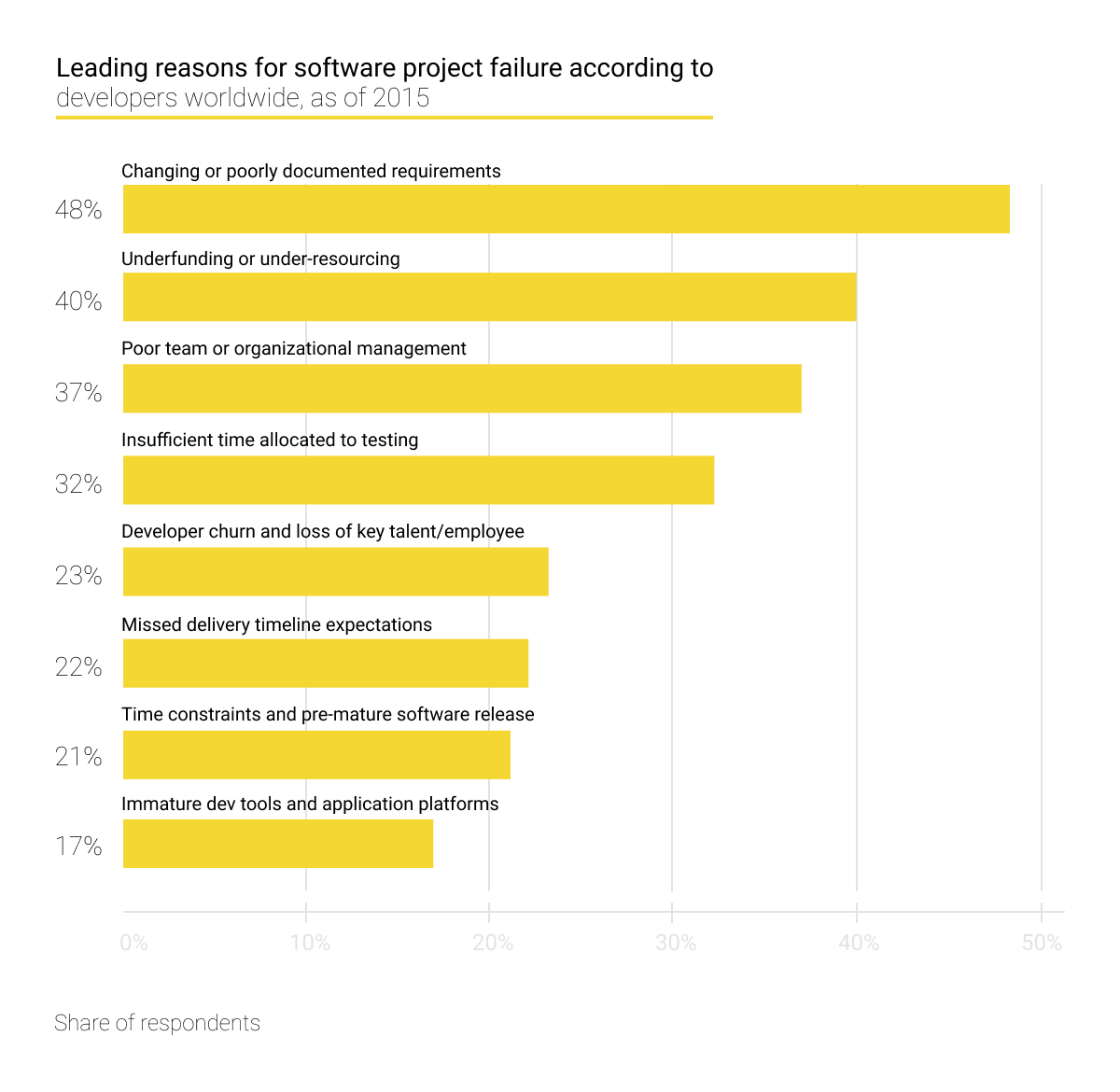- DevOps in a nutshell
- The role of a DevOps engineer
- Key DevOps benefits for businesses
- Why do you need DevOps?
- Wrapping up
The topic of DevOps has been a hot one in the IT world for the last few years. Joining software development and operations together has made product development, launching, and market entry simpler and speedier. Top businesses, including WhatsApp, Slack, Amazon, Netflix, Nordstrom, Facebook, and Adobe, have successfully adopted this trend. Despite its popularity, however, not everyone fully understands what it entails and how it can benefit companies seeking to enhance efficiency and speed up the release of digital products. Here, Andersen's experts explain who a DevOps engineer is. They also single out the primary DevOps benefits for businesses.
DevOps in a nutshell
The word stands for Development and Operations. It involves processes and techniques aiming to shorten the software development life cycle and make it more flexible. According to GMI Research, its market share exceeded $7 billion in 2021 and is projected to grow by 20% from 2022 to 2028, reaching nearly $30 billion.
So, merging technology, methodology, and people from both development and operations domains triggers a cohesive and uninterrupted workflow. This integration aims to create seamless processes. The methodology originated from two concepts, namely continuous integration (CI) and continuous delivery (CD) and has expanded beyond being just another noticeable IT phenomenon. Companies now have entire departments dedicated to delivering DevOps consulting services, reflecting its power and popularity.

Highly skilled engineers with expertise in both software development and operations collaborate to create a seamless process that spans everything from design and development to product releases and support. These well-coordinated teams function like expert machines, which leads to exceptional efficiency and effectiveness.
Key practices encompass design, automation, testing, cloud services, monitoring and logging, releasing, and configuration management.
The role of a DevOps engineer
Numerous questions come up when discussing this methodology. “Who is a DevOps engineer?” is one of them. Therefore, to uncover the benefits of this approach, we should reveal the meaning of "DevOps-engineer” first.
These specialists play a vital role in the SDLC. Their duties vary depending on the organization's needs. Primary DevOps roles and responsibilities include:
- facilitating teamwork to ensure on-time delivery of software products. They work to create a culture of communication between IT professionals and other stakeholders;
- enhancing development and deployment processes with automation. Their goal is to detect and get rid of manual operations, replacing them with automated tools and systems that can help quicken software development and release;
- controlling applications and infrastructure for optimal performance is another role of a DevOps engineer. They use tools such as monitoring software, logs, and metrics to identify and address issues that may be affecting performance, ensuring that software applications are running as smoothly and efficiently as possible;
- finding and enacting process improvements. They work to constantly enhance the software development and deployment processes, identifying areas that can be optimized to improve efficiency and reduce errors;
- checking compliance with industry standards and regulations is one more significant role of DevOps engineers. They make sure that software products meet the necessary HIPAA, GDPR and other requirements, protecting user data and ensuring that the software is safe and secure;
- managing and maintaining the infrastructure supporting software applications, including servers, networks, and databases. They check if the infrastructure is properly configured, secure, and up-to-date, ensuring that digital products can run smoothly and securely;
- effective communication with stakeholders, such as developers, management, operations teams, and customers, is also a vital part of DevOps roles and responsibilities. They keep everyone informed of progress, issues, and updates.
Ultimately, engineers are key to achieving effective, dependable, and secure software development and deployment processes, resulting in products that fulfill customer demands and expectations.

Key DevOps benefits for businesses
Companies used to think that keeping development and operations apart would lead to more significant outcomes. However, this caused a disconnect between teams, resulting in communication gaps and delays when working on the same product. Due to this, launching a solution to the public took more time than it should have, thus preventing overall success.

Those embracing this methodology enjoy various DevOps benefits for business, including:
- Technical benefits: quicker product launches, higher quality items, and faster response times;
- Business benefits: improved efficiency, flexibility, improved relationships with end-users;
- Company-culture benefits: enhanced communication, collaboration, and a step away from silo mentality.
However, the primary advantages of DevOps are technical. Connecting development and operations enables ongoing integration, delivery, and deployment.
These tactics help to streamline the process of getting products to the market, tackling security problems, and dealing with bugs right away.
Overall, the methodology represents a significant shift away from conventional development practices, allowing companies to operate more efficiently and effectively in the modern business landscape. Taking on this approach leads to businesses gaining benefits that result in increased success and expansion.
Why do you need DevOps?
This approach encourages a dialogue between multiple teams and experts. It seeks to make the development and delivery of software products more efficient by fostering a culture of continual integration, testing, and deployment. Here is why you need DevOps:
- Quicker time-to-market: businesses can bring their digital solutions out much more frequently. Automating vital SDLC processes shortens the gap between having an idea and executing the plan.
- Improved software quality: it stresses the necessity of testing and quality assurance throughout the entire development process. Timely tests and constant control help IT professionals detect and fix bugs quicker, resulting in top-notch software and a reduction of defects in production.
- Strong collaboration and communication: it promotes a fruitful dialogue between different teams. By removing silos and stimulating a cross-functional approach, the methodology can help teams collaborate and rapidly solve problems.
- Enhanced security: pioneering practices also address the problem of security. Efficient security testing grants IT specialists the opportunity to locate and handle security vulnerabilities before they turn into major issues.
- Enhanced agility: this approach enables businesses to quickly pivot and respond to changing market and customer needs. This can help companies stay competitive and responsive to evolving demands.
As you can see, the importance of DevOps is clear. If you embrace best practices in this area, you will stay competitive and responsive to the changing needs of your clients.
Wrapping up
In today's fast-paced digital landscape, companies are constantly looking for ways to gain an edge over their competition. The adoption of DevOps has become increasingly popular as it offers numerous advantages for designing, deploying, and monitoring software products. By leveraging modern technologies, businesses can achieve better collaboration, automation of workflows, increased efficiency, and streamlined processes leading to the creation of top-notch digital products.
At Andersen, this efficient methodology is not just a service we offer; it's a way of life. Our team of seasoned engineers possesses unrivaled expertise and experience, having successfully completed over a thousand projects. We are passionate about helping our clients achieve their goals. Partner with us and unlock the benefits of DevOps for your company. Let us take your business to new heights of innovation, competitiveness, and success.






